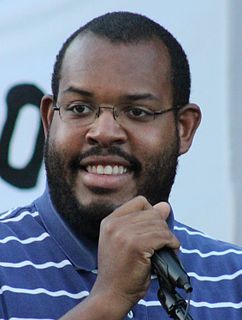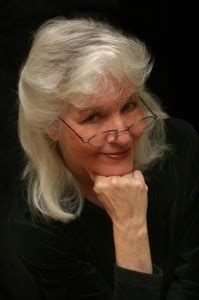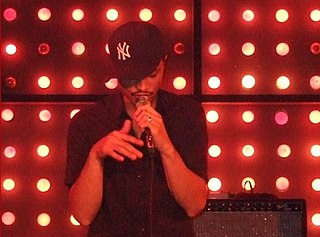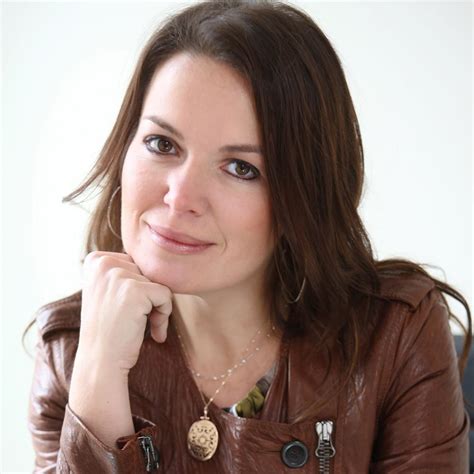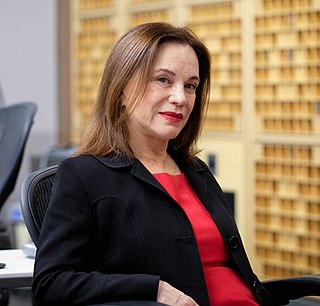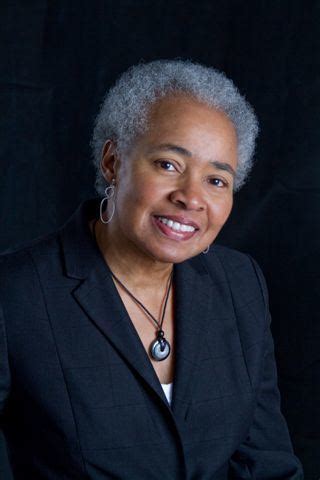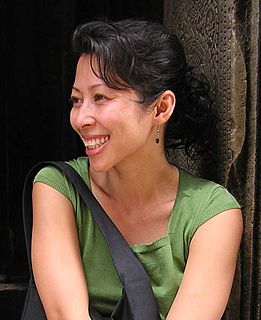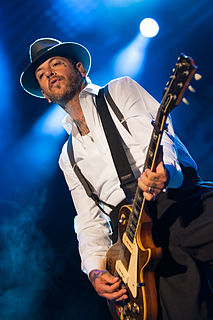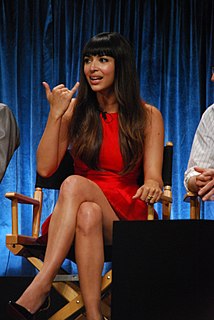Top 552 Activist Quotes & Sayings - Page 9
Explore popular Activist quotes.
Last updated on November 18, 2024.
I feel like I have more in common with conservative people who have activist causes in their hearts and who are interested in electoral politics than I do with somebody who doesn't care, doesn't have any political interests, doesn't know what policy is, and doesn't think any of it matters to them. If you care, we're actually going to have a basis of conversation. We might supplementally get along very well, and that might be complicated and fun in a way that is more constructive than you'd expect.
The issues which mattered to me as an activist, mainly things like prison reform and AIDS, have less of a chance of getting covered on my show than things I don't have a personal interest in. It's because I don't trust my antenna about being a good storyteller on those subjects, because I know a lot and therefore lose touch with what the average person might find interesting about them.
Many people have written about the economic meaning of globalization; in One World Peter Singer explains its moral meaning. His position is carefully developed, his tone is moderate, but his conclusions are radical and profound. No political theorist or moral philosopher, no public official or political activist, can afford to ignore his arguments.
I got involved as an activist when I was in high school, around the Iraq war. That's how I got involved. It seemed like, OK, we're going to go to war. It doesn't seem like a good idea. Someone should do something. I'm looking around and, like, I am someone, and I might not be able to do everything, but I can do something.
If you can shape your business life or your working life, you can just look at it as another extension - you just fulfill all your values as a human being in the work place. If you are an activist, you bring the activism of your life into your business, or if you love creative art, you can bring that in.
My mother was really involved with the Refusenik campaign with Soviet Union Jews. They would come and stay at our house, some of them, after they managed to get out of the Soviet Union at the time. There were things that were Jewish-related happening in my house quite consistently, but it was much more from a kind of activist standpoint.
Surely people can now see that it is no accident that he, Obama, sat at the feet of the Rev. Jeremiah Wright for 20 years, that he is mother was a leftist activist and cultural Marxist, that his main early mentor was radical Frank Marshall Davis, that he was a member of the far-left New Party in Chicago, that his main vocation in life has been street organizing and agitation and that he didn't think the revolutionarily, transformative Warren court was liberal enough.
What stunned me was the regular assertion that feminists were "anti-family." . . . It was motherhood that got me into the movementin the first place. I became an activist after recognizing how excruciatingly personal the political was to me and my sons. It was the women's movement that put self-esteem back into "just a housewife," rescuing our intelligence from the junk pile of "instinct" and making it human, deliberate, powerful.
You wouldn't know that if you talked to Human Rights Watch or Amnesty International or some of the international activist organizations. Certainly you wouldn't know that if you were talking to some of the writers who criticize our drone policy. But I've actually told my staff it's probably good that they stay critical of this policy, even though I think right now we're doing the best that we can in a dangerous world with terrorists who would gladly blow up a school bus full of American kids if they could.
I can only tell you the kind of power I want, which is the power to persuade. But I do not want the power to tell other people what to do. Persuade assumes that the other person is going to make the decision. Especially as a writer and an activist, I want the power to put ideas and possibilities out there, but I understand that they will only work if they are freely chosen, so I don't want the power to dictate or to force the choice, ever.
Americans would have a right to go to war with the Iraqis if we could name one author from Iraq. It disturbs me that we're going to war with somebody we know absolutely nothing about. Name one Iraqi poet, one Iraqi woman activist, one Iraqi singer. Name one Iraqi novelist. You can't. And how can you go kill someone you don't know anything about?
I think overtly political novels - those that never transcend or contest their author's conscious intentions and prejudices - are problematic. This is not just true of the innumerable unread books in the socialist realist tradition, but also of novels that carry the burden of conservative ideologies, like Guerrillas, Naipaul's worst book, where the author's disgust for a certain kind of black activist and white liberal is overpowering.
The first generation of school reformers I talk about - nineteenth century education reformer Horace Mann, Catharine Beecher - they are true believers in their vision for public education. They have a missionary zeal. And this to me connects them a lot to folks today, whether it's education activist Campbell Brown or former D.C. public schools chancellor Michelle Rhee. It's a righteous sense, a reform push that's driven by a strong belief in a particular set of solutions.
I find myself in this bizarre position in which everything I write and talk about is pretty much about this issue, the environment. It feels a little too comfortable, because at the end of the day I can rationalize that I'm doing my share. I don't know if I actually am, I don't know if I should be more of an activist than I am. But at the end of the day, everybody needs to do those things that they're most likely to continue doing, and that aren't going to burn them out.
Essentially, my kids grew up with the emphasis on the environment because I became a political activist in about 1969 and it was not an easy time. Those were the days when the oil and gas companies pretty much controlled the show and anybody speaking about solar energy or carbon energy would get smashed down as being a radical or a tree-hugger or what have you. So I was out there feeling very often alone and my kids would get that.
I listen to audiobooks: the last one was Vivienne Westwood's biography. She's the most amazing woman. The way she's used her platform in fashion to be an activist and promote causes like global warming, climate change, and inequality in the world... It gives high fashion, what seems like it can be 'for a certain group,' a way to help real causes.
An Arab activist can take pride in the Arab heritage of mathematics and science or he can take pride in his religion, and there's pride to be taken in both. But one of them could be exploited much more easily and has been in the context of world conflict. And the other is very difficult to do on the grounds that science and literature and mathematics have been among the uniting factors in the history of the world.
Here in America we have a man [Donald Trump] who is a master of a medium that is all about self-aggrandizement and/or cruelty to others. I have been off Twitter lately because I had this sudden sort of feeling of, this man is the president of this club and it's not a club that I want to be in. Sometimes I feel like, well, perhaps it's not right because as a political activist, this is where politics is happening right now. This is where the conversation is going on, but at the same time, I think there is something corrosive about it.
I said to one young activist who herself was the daughter of an undocumented worker, and so could speak from a very personal and legitimate perspective - I remember saying to her: I agree with you, from a moral perspective, that a child from Honduras is worth the same as my daughter. God is not a respecter of boundaries; he's not saying that American kids deserve a better life than Honduran kids. But I'm the president of the United States, and the nation-state by definition means that boundaries mean something and borders mean something.
I feel like, in many ways, Billie Holiday's still very under-appreciated as an artist. People focus on her voice, and all of the very recognizable vocal things that she does, which are great. But I wanted to, with this project, start the conversation again about her as a radical feminist, as a civil rights activist - taking a stance. And also just [her] being a non-conformist.
I've been a social justice advocate all my life, becoming an activist for women and human rights even in high school, and found ways to weave it in to my later for-profit career. The first film I got involved in was Christy Turlington's "No Woman, No Cry" , which was about the impact of maternal health around the world. It brought this important issue to light, and even though I wasn't in a credit position, I helped her find ways to screen it.
I feel like we've inherited modern infrastructure, and I could run away from it and become a full-time activist, or I can try to do my job, and try to talk about things I care about, and be able to do something like sponsor a topsoil conference in Nova Scotia, and talk about Bill McKibben, and narrate a documentary about the vanishing of the bees, and try to navigate my way through this world the best way possible. That's what I'm trying to figure out. Probably like many people right now.
Let's concede that we have decided to let our children grow up in two separate nations, and lead two separate kinds of lives. If, on the other hand, we have the courage to rise to this challenge to name what's happening within our inner-city schools, then we also need the courage to be activist and go out and fight like hell to change it.
I have been an organizer and then activist and a legislator, all of that. But then there's this big gap after I advanced in Congress and ended up as the ranking member of financial services committee. It took me into the financial services issues and Wall Street and Dodd Frank. And it took me away from the things that I did years ago.
I think I've always had an activist stance, yet at the same time, the other side of me - and this is where some people just don't get it, or they'd prefer it if the work was a lot uglier, a lot louder - I have this personality where I just want to put something out that's a fact and then let you interpret it. It's almost as if you might barely notice it, you might walk right by it, but you have to pay attention.
I read everything and anything related to being queer. I found solace in reading authors like Audre Lorde and bell hooks, who would become my activist staples - their words helped me grow up and taught me how to be bold and courageous. By studying them, I came to understand that being young and queer and black would not be easy.
Adolescents have the right to be themselves. The fact that you were the belle of the ball, the captain of the lacrosse team, the president of your senior class, Phi Beta Kappa, or a political activist doesn't mean that your teenager will be or should be the same....Likewise, the fact that you were a wallflower, uncoordinated, and a C student shouldn't mean that you push your child to be everything you were not.
My idea of what was going on in politics was driven by activism. I came out when I was 17, and right away I started working in the AIDS activist movement. For me, politics was about getting drugs approved and getting prisoners access to the same kind of drugs that you could get on the outside. It was about getting needle exchanges approved. That was politics. These were policy problems that were killing people, and we were trying to get them changed.
I wrote an essay too, and mine started something like, "When I was asked to contribute to this book, I said, 'I could do a piece on [Larry] Kramer as a pain in the ass, but I suppose you have too many of those, as it is.'" And Sarah's began something like, "When I read about America's angriest AIDS activist, I can't believe they are talking about my sweet Uncle Larry."
I don't think Dr. King helped racial harmony, I think he helped racial justice. What I profess to do is help the oppressed and if I cause a load of discomfort in the white community and the black community, that in my opinion means I'm being effective, because I'm not trying to make them comfortable. The job of an activist is to make people tense and cause social change.
Berta Caceres was a Lenca Indian activist well-known in her country, shot in her home. She was not only known in Honduras, she was one of the world's best-known environmentalists and had recently opposed plans for a dam on a river considered sacred by the Lenca. Honduran police have said they are investigating the murder as a botched robbery, but many of her colleagues believe Caceres was targeted.
People who have come of age from the '80s on have experienced a form of activism that's very sterile and annoying. It's not that much fun to be an activist. That's partly by design. They are sterile protests and anonymous e-mail activism - not the kind of thing where people fall in love, form friendships for life, and see the change they make right in front of them. I've seen that, when people start to experience doing these things together and the power that it has.
Find other women to make movies with that have a shared bottom line. I did that with my first film and found an incredible partner in the inimitable writer/producer Laura Goode. I did it this time around by pairing with the forces of nature that are Amy Fox, Alysia Reiner and Sarah Megan Thomas. All of these women share an activist's desire to be the change they want to see - and with that passion comes great purpose and great possibility.
Conservatives . . . may decide to join the game and seek activist judges with conservative views. Should that come to pass, those who have tempted the courts to political judging will have gained nothing for themselves but will have destroyed a great and essential institution. . . . There are only two sides. Either the Constitution and statutes are law, which means their principles are known and control judges, or they are malleable texts that judges may rewrite to see that particular groups or political causes win.
Technology is a tool, and it's a platform. Nobody gets arrested for being a blogger; people get arrested for dissent. Nobody gets arrested for putting information about themselves online; they get arrested for being an activist. I'm a strong believer in the fact that you should not blame the tools; you should blame the circumstances.
I'm inspired by strong, courageous women. My mother is the definition of a self-sufficient, independent woman whom I have always looked up to. I also greatly admire incredible women like Aung San Suu Kyi, and human rights attorney Nasrin Sotoudeh, who was wrongfully imprisoned for 4 years in Iran, simply for giving a voice to the voiceless and defending the helpless. And I'm in awe of the young Pakistani student and activist, Malala Yousafzai, for her bravery and resilience in the face of brutal repression.
I know I certainly wouldn't be writing books if it hadn't been for the feminist blogosphere, and I think that's a really amazing thing. And just the sheer power of outreach I think is incredible. It used to be that if someone was to get involved in feminism, it was probably because they were already interested. They were already interested in feminism; they were already interested in being an activist, and they found their way to like a NOW meeting or to a consciousness-raising group or something like that.
It's not like activist work is a nice add-on to what's really important, the spiritual work. The two are inseparable and it goes both ways. Many people are hardcore activists for decades, and they encounter burnout, futility, or a feeling of imbalance. Sometimes they need to go so far as to drop their activism and go on a spiritual journey. They're realizing that all the stuff they're trying to change in the world isn't just out there in the world. It's in them, too. And as long as they're blind to what's in them, they're going to continually re-create it in all that they do.
The failure of the first Barack Obama administration to really deliver on a new War on Poverty and a new language to explain these societal challenges in some ways provided the fuel that led to the Occupy Movement a few years later. And, while Occupy was a somewhat transitory phenomenon, many of the activist groups that emerged during this period are still out there, and still working on reshaping the political debate around taxes, around welfare, around government assistance to the poor, around debt relief for students, and so on.
Finally, a prominent nation is taking on the homosexual agenda and rejecting it outright. A number of African nations have done the same, but third-world countries are not newsworthy to mainstream media. The irony is stunning that a Communist nation would understand that preserving the value of men and women marrying and producing children makes for demographic survival, while many American Christian leaders cower in the shadows, in fear of activist homosexuals and their leftist supporters. I say 'cheers' to the Russians on this one. That nation will probably outlive America.
Implicit in the activist conception of government is the assumption that you can take the good things in a complex system for granted, and just improve the things that are not so good. What is lacking in this conception is any sense that a society, an institution, or even a single human being, is an intricate system of fragile inter-relationships, whose complexities are little understood and easily destabilized.
I think it's very important that we protect marriage as an institution between a man and a woman. I proposed a constitutional amendment. The reason I did so was because I was worried that activist judges are actually defining the definition of marriage. And the surest way to protect marriage between a man and woman is to amend the Constitution.
If I focus on being an activist and my job is to be a rapper, I'm not going to be as good of a rapper. I need to focus on hip-hop and focus on making the music, so that when the activists come to me and they need my voice to create a platform, then I've got enough people listening to me. Not because I'm conscious, but because I'm dope.
I strongly believe that marriage should be defined as between a man and a woman. I'm troubled by activist judges who are defining marriage. I've watched carefully what's happened in San Francisco where licenses were being issued, even though the law states otherwise. I have consistently stated that I will support law to protect marriage between a man and a woman. And obviously these events are influencing my decision.
Navalny is a blogger-turned-activist, but he finds stuff and he puts together these very, very clever, very high production value videos which underline the corruption at the top of the system, and there are millions of people who watch them. Some people think he must have some kind of protection inside the system because he hasn't yet been completely put out of commission; he's allowed to go on. He himself has said he wants to run for president.
When I started out as an activist, the issues were much clearer. There's advantage to the new media, but on the other hand, you miss the ability to frame an issue that you had when there were just three TV networks: CBS, NBC, and ABC. So the whole world could see the same police dogs. The same Bull Connor and his white tank. Now you've got narrow-casting. The media is all fragmented. It's so hard to get people to focus in a sustained way.
I have my writing therapy. For me, writing and friends therapy is an internal journey where you go in deep, you reflect, you try to heal your inner child. But as an activist, there's the outward, going wide therapy, where you get to realize at a certain point that talking about yourself gets boring. And it's also unhealthy to be so much into yourself. At some point, you have got to be able to look at the issue and say, "It's not about you. It's about a culture, a people, a nation, a family."
I have fantasy jobs like working in retail at a department store just selling rich housewives outfits and saying 'this looks fabulous on you! Let me find a matching handbag!' Then, the other is being like some sort of Vice or taskforce, law enforcement, undercover [person]. Or possibly someday becoming a guerilla activist - I'm kind of in-training for that now anyways. So, maybe my retirement will be jumping on ships, kidnapping, and [participating in] espionage. I still fantasize.
I'm really into the rights of immigrants, the rights of the working poor. I'm one of those little activist types. I probably would have just gone to law school. And the scary part is that I was one of those kids who always tested really well. You put a test in front of me, and I would have been like do-do-do-do-do. I probably would have been some community lawyer somewhere - if anything, that's probably what I would have been doing.
My family’s said to me from the beginning, ‘People are always going to tell you to pick what you want to be when you grow up. You take that and throw it out the window, that’s garbage. People are complicated and we love many things and we’re passionate about many things. You can be a human rights activist and also be doing these comedy plays in your community and that’s OK. All those things are a part of who you are and you can love them equally.
I don't make movies about issues. This is my same litmus test for all the movies I love: Is it a great character on a great emotional quest with a great emotional need? Do they overcome great emotional obstacles? Is it a fantastic story? I didn't set out to be a political activist. I'm just a human being who's moved by certain things, and if certain things break my heart, I set out to fix them.
I'm not a lawyer I'm a kind of mouthpiece/activist type, though occasionally they shave me and stuff me into my Bar Mitzvah suit and send me to a standards body or the UN to stir up trouble. I spend about three weeks a month on the road doing completely weird stuff like going to Microsoft to talk about DRM.
I do have a plan for the country [the USA]. It needs education. And there should be drug education - only people should be taught how to smoke pot, because even potheads don't know how to smoke pot. I've evolved into not only an activist, but an educator. I want to show people how, when, and why they should smoke pot.
Over the years, I've found that I either live life or write about it. I can't seem to do both simultaneously - I have to do it sequentially. When I write incessantly, I lose touch with the issues and passions that fuel the work. But when I get too involved in organizations or movement endeavors, I almost forget that I'm a writer. It's a constant struggle to find a balance between these two worlds - the solitary writing life and the life of a social justice activist.
Consider in Washington, around the country today we are talking about balanced budgets, paying down our national debt, getting the economy going, defending ourselves, activist judges. Newt Gingrich did all those things when he was speaker. We got tax relief. We got balanced budgets. We got, you know, job creation. We paid down our national debt.


